#it’s my favourite historical era EVER
Text

A while ago I commissioned the wonderful @yoshitsuno for this regency/Bridgerton inspired piece of Sharp and MC & I received the final piece today! Safe to say this exceed all my expectations & I am so so happy with how this turned out!
Merci, Micah! Your work is absolutely stunning & I am beyond impressed with your skill, talent and dedication. I love this so much & I am so thankful you made all my wishes come true 💗💗
✨ To anyone looking for an artist to commission, I can highly recommend @yoshitsuno ! Her work is absolutely incredible and she’s a wonderful person all around 💗 This was a 10/10 experience - 100% will do it again!! ✨
#catch me not shutting up about this for months now#made all my Bridgerton/regency dreams come true and more#obsessed is an understatement tbh#10/10 would do it again#so so worth it!#can you tell I am obsessed with regency? because fuck#it’s my favourite historical era EVER#the tenderness??#the looks??#the overall vibe??#PERFECTION#hogwarts legacy#aesop sharp#professor sharp#professor aesop sharp#aesop sharp x mc
39 notes
·
View notes
Text
thinking about taisho era jade born into a merchant family and he's schemey and sly as usual but really he just loves purchasing strange flora and fungi from the west. and then he meets you, an orphan who makes a living by selling flowers that you grow by yourself, not knowing how difficult it actually for other people to grow said plants because you were born with an insane green thumb and so all plants thrive under your care hehehe. he's so intrigued by you he basically hires you as his greenhouse assistant and loves spoiling you with new flora and eventually accessories that remind him of your plants (giving someone a hairpiece = marriage proposal)
he's supposed to be marrying someone with a stronger family backing so he can increase his business relations but nope. he's dead set on marrying the person who made his heart bloom♡
more thoughts continuing here!✧Masterlist
#for anyone who doesn't know taisho era is a period in japan in the early 20th century#just basically traditional japan starting to modernise and trade more with the west#and omg the new years jade card is screaming taisho fashion ahhhhh#my favourite historical eras ever hehe#twstnexus#rinna rants#twsited wonderland#twisted wonderland x reader#jade leech#jade leech x reader
230 notes
·
View notes
Note
Okay, but what if it was Victorian Era!Jake's mother or mother-in-law who laced up his wifey too tight? Just to "teach her a lesson", because she doesn't like wifey being married to Jake or something... And wifey is too stubborn to let the woman know she is in any discomfort, so she doesn't say a word to anyone about it until the event is over and she is all alone with Jake in their own bedroom, far away from the evil woman. And throughout the event she would sometimes grip onto Jake's arm tighter for support, or lean on him more, or ask to stop dancing before the song ends, and she doesn't eat much if at all of the food, even though it's her favourite, so Jake knows something is wrong, but he knows better than to verbally ask her, so he just looks at her with a look only she knows to be concerned (because Jake knows that his wife is a very proud woman, and she would hate for everyone else around her to know/think she is weak, especially her mother/mother-in-law, when the whole point is to prove a point against the woman) and she just squeezes his hand, and gives him a small shake of her head, to let him know she needs his support, but not make it too obvious (it helps that Jake never was one to leave her alone for too long at these events). And so when they are alone in their own room, far, far from everyone else, she finally lets the facade go and she gasps for air, and Jake knows immediately what to do, and he hurriedly takes the corset off, and his wifey is crying from relief when she can finally breathe normally. Jake sees red at the thought of someone doing this to her, but he is still the most gentle ever with his wife as he touches her and holds her and asks her who laced her up, although wifey can hearthe barely restrained rage. And at first she is hesitant to tell him, because she doesn't want to hurt him by revealing that either of their mothers doesn't approve, so it takes Jake listing off the potential suspects for her to burst out "no, it was my/your mother!". And she is crying and he is shocked, but only for a second, because then it makes perfect sense, and finally he understands why the woman looked so displeased the whole evening - because wifey held herself together and her plan didn't work. Needless to say, Jake pampers wifey the whole night and morning , and will never let anyone else lace her up, other than himself.
First of all, I love that we're writing novel length asks for this concept lmaooooooo
So, one thing that's very interesting about the corsets that a lot of people don't realize is that they were not meant to be tight. Corsets were meant to be support items like bras. You had to be able to move around in them and do things, so it wouldn't make sense for them to be suffocating or restrictive. I know we all want the Pirate's of the Caribbean scene where she feints, but my loves, that's just not realistic, and if you've been following me for a while, you'll know that I try to be as realistic with my historical AUs as possible.
Now, with that being said, I could see someone tying reader's corset waaaayyyyy too tight just to be vindictive!
And you're right. Jake would be absolutely livid once he finds out. He'd be so gentle with reader, stroking his hands up down your sides in a bid to soothe you as you catch your breath. He'd kiss the frustrated tears away, urging you to lay back as he strokes your hair and whispers those sweet nothings. He'd gather you up in his arms and just let you cry out the frustrations.
Now, I imagine that it would actually be Reader's mother who did this. I picture her as very controlling, wanting everything to be just so in the name of the family's honor. I'm not sure if she approves of Jake, but does know that he's from a very well-to-do and respected family, so maybe she's upset because Reader told her no about something. Mother knows best, after all, so how dare her daughter tell her no!
I think the next time Reader's mother is over, he'd do something very subtle to embarrass her publicly for the stunt she pulled with his wife. She won't soon try something like THAT again.
#answered#anonymous#hey nonny nonny#victorian era!jake#jake hangman seresin x reader#jake seresin x reader#hangman x reader#ve!jake
77 notes
·
View notes
Note
love your scholarship 🥸
do you know anything about their school/college days - ie if they liked school/had favourite subjects/took particular classes? if Quinn and Luke declared majors at mich?
also if they’ve ever said what they read? think I read that Jack says he likes to read (sports books maybe?) in his spare time and one in of Ellen’s interviews she talks about reading (to them?) and somewhere else about how she was super involved in their academics
The teacher in me is fascinated!
quinn was enrolled in the school of kinesiology and majoring in sports management.
in 2021 he said
If you weren’t a hockey player, what else might you be doing? — Veronica X.
I don’t know, I love golf. I’d probably be golfing a lot. I’d be in school somewhere … I’d be a senior right now so I’d probably be getting my degree in the next couple of weeks. Maybe business or sport management? That’s what I was looking at at Michigan for two years.
luke's intended major was also sports management. he was taking a business management class and fumbled his part on a group project when he signed with the devils. he took a greek sports history class and talked about how he doesn't love school but he likes history here (worth listening to imo) and he also enjoyed history of college athletics. luke actually took an online college class before officially starting at umich
"I'm taking an online chemistry class to get it off my plate. I wake-up and do two hours of that and then I go and work out with [trainer] Brian Gallivan and then I skate and then just chill by the pool and hang out. It's been nice."
here's a snippet from quinn about books
Hughes has become an avid reader to expand his knowledge and make better use of downtime. He recently completed “The Boys in the Boat” historical epic that was made into a movie directed by George Clooney.
“I buried it, it’s done,” Hughes proudly stated Tuesday after practice. “I finished it three weeks ago. Great book. Page turner. I’m reading ‘Moneyball’ now.”
“Boys in the Boat” is a riveting and true account of how the Depression-era University of Washington junior varsity rowing team stunned the world by overcoming immense odds to capture gold at the 1936 Olympics in Berlin.
Joe Rantz was a driving force for the eight-man crew. A strong rower with an unshakeable disposition sounds a lot like the driven Hughes.
“I thought Joe was just a hard worker who did his job and was a quiet guy,” said Hughes. “He appreciated everything that came his way. He pretty much raised himself from the age of 10 and was a very outdoors person.”
he apparently is "reading a book almost weekly to try to improve his brain" and he also was spotted reading Stay Sane in an Insane World: How to Control the Controllables and Thrive
jack likes reading sports books as said here, specifically Eleven Rings: The Soul of Success and Three-Ring Circus: Kobe, Shaq, Phil, and the Crazy Years of the Lakers Dynasty. The Mamba Mentality: How I Play was on his reading list in high school. he also talks about books here
Craig: The other thing that (Williams) said was reading. He said you’re asking for book recs. We’re looking for book recs. We’re big readers.
Jack: Yeah, you guys got any? I dunno. (I’m tired of) everything on my phone, social media, things like that — and I never went to college, so you gotta get smarter somehow.
Craig: Are you a fiction guy? Are you a self-improvement guy? What do you find yourself gravitating towards?
Jack: I read a lot of sports books. “Eleven Rings,” by Phil Jackson. Also, “Greenlights” by Matthew McConaughey. Those are my favorite ones I’ve read recently. It’s important. We’ve got a lot of down time on the road, so it’s good stuff.
as for ellen, she said this in the cammi & aj podcast
So for me, you do things that you enjoy or you- you teach them things that you feel like you can teach them, Right. So it's kind of a slight on me that I wasn't more worldly and wanting to take them to museums. Or maybe like I felt like I had do those things because like, ‘Oh my God, what am I teaching them?’ But you tend to do the things that you - you're trying to find activities. Jimmy was off coaching a lot, I had three young boys that were really close in age. So what do I know? What can I do to pass time and keep them active? It was kicking a soccer ball. It was throwing a ball, it was doing rollerblading, it was passing the puck, it was taking them skating. So for me, those were mommy and me activities, right? And then every once in a while I'd be like, you know, I'd be like, ‘uh, we got to do Kumon, we gotta do like - we gotta read.’
You know, academics was really important to me because I felt like I was so driven the other way that like, I didn’t want to miss out on the other. So for us, it was never this grandiose plan, and I'm sure you guys were the same way. It was more like, ‘be the best at whatever it is you're doing, work your hardest at whatever it is you're doing.’ Working the hardest didn't mean scoring the most goals. It was playing the right way, whatever it is, being a great teammate and working really, really hard and we always felt like the other would come.
other potentially interesting notes, jack was an honor roll student in 8th grade, and quinn agreed he was the best at school when they were younger, so it's funny he's the one who didn't end up going to college. ellen's brother is actually the president of denison university and they have some pretty academic cousins also.
63 notes
·
View notes
Note
What are some of your other favourite medieval misconceptions? Everyone only ever wore shades of brown?
Other "favorite" medieval misconceptions, "favorite" here having the meaning of "cause my eye to start twitching uncontrollably and a red haze to descend" include:
Everyone in the Middle Ages was always dirty, miserable, and sad
Peasants worked all the time and were constantly on the verge of starving to death (bonus points if "all medieval people were peasants")
Everything was violent, bloody, and "barbaric"
People could expect to get gruesomely dismembered at all times and for any reason
Politics was exactly like Game of Thrones/Game of Thrones is an Accurate Representation of the Medieval World/pretty much anything whatsoever citing Game of Thrones as historical text
Everyone in medieval Europe was white, straight, cisgender, and Christian
Disabled people were ignored/destroyed/"put into asylums" (because the medieval era is exactly like Victorian England!) and/or had no recognition in their community and/or were just left to die
Queer people did not exist/were always persecuted/had no opportunities or framework to live/identify like "modern" people
"Medieval history" only refers to Europe and/or Europeans
Pretty much anything to do with the Vikings, whether in far right/white supremacy or Oooh The Vikings Were So Liberal
The all-powerful Catholic church completely controlled everyone's minds and everyone blindly obeyed them in all things until suddenly, one day the Renaissance happened! Yay!
The Renaissance suddenly gave women rights!
The Enlightenment suddenly gave women rights!
[Fill in the blank] suddenly gave women rights!
Evil historians are hiding the real truth of [insert marginalized group here] from you
The only thing medieval people cared about was religion and they were all religious zealots
Conversely: people were always desperately trying to break free from the church but they were constantly stopped from doing so because the church was, again, all-powerful
Women were silent, illiterate, uneducated, oppressed, and only ever expected to serve their husband/have endless babies/keep the house clean (which somehow coexists in their minds with "everything was dirty all the time")
Women always died in childbirth
Women did not have jobs, education, or any recognition in society
Women could never be rulers, warriors, or any other "male" job
Women could constantly expect to be raped and this was a normal and natural part of medieval society (bonus points if invoked to defend some modern "medieval" media as "historically accurate")
Women were constantly viewed as witches in the premodern era
Anything a woman did that was "unusual" would get her accused (and often killed) for witchcraft
There were no cosmetics, beauty standards, personal hygiene, etc., so people never combed their hair, dressed nicely, used makeup, washed, etc etc
Medieval people/society had no use for artists/art, literature, books, classics, or other high culture, because that was all instantly forgotten when Rome fell and nobody found it again until the Renaissance
Medieval people all died when they were thirty
Medieval people never traveled more than 10 miles from home
Medieval people never questioned their society/their place in the world/anything else; they just accepted their lot in life without complaint
Things have been a perfect straight line of progress ever since and modernity is "better"
Do I have some things to get off my chest here?
Maybe
You can't prove it
Shh
270 notes
·
View notes
Text


Fond Farewells Mark the End of an Era for The Crown.
Pt 2 of Season 6 Accedes to the Next Generation – But Reigns Most Triumphant Saluting Its Sovereign.
Review & gifs by L.L @The Crown TV
I wasn't sure what to expect from the final 6 preview episodes of The Crown. Part 1 gifted us with a season-defining performance from Elizabeth Debicki, but such intense focus on the tragedy of Diana and Dodi's deaths was heavy-going. How to move forward?
Not many TV shows stick the landing, but I believe The Crown does, mostly by putting Queen Elizabeth front and centre. In four different ways! But Part 2 takes a while to forge ahead and reign triumphant.
Ed McVey and Meg Bellamy make shy William and swotty Kate believable as a young couple who meet at university – or earlier, as per a flashback with (not Ghost!) Diana. I still found it hard to invest in their will-they-won't-they relationship (we already know they do.)
Instead, it’s sisters Elizabeth and Margaret who have long been the emotional heart of this show; at every stage of their lives.
Former Oscar-nominee Lesley Manville (alongside Queen Imelda Staunton) is truly magnificent in Ep 8 as Princess Margaret, though it's painful watching this vibrant lady struggle as her health worsens.
Memories of the 1940's are a delight. However, I wish we'd seen more of wide-eyed teen Lilibet let loose (Viola Prettejohn) and carefree Marg (Beau Gadsdon) before older Margaret says her final goodbye.
Staunton saves her best for last, bringing dry humour, vulnerability as well as leadership to Ep 10. The 70+ min epic finale 'Sleep, Dearie Sleep' has its shaky moments, but beautifully completes Queen Elizabeth's story when it counts, bringing near-perfect closure. That alone elevates Season 6 beyond Season 5.
Warning - MAJOR SPOILERS AHEAD. This is my final *EVER* review (might be extra long!)
S6 is NOW ON NETFLIX - WATCH THE EPISODES before reading.
Images: courtesy of Netflix
Starting with less good news; the first couple of episodes of Part 2 were my least favourite. Ep 5, 'Willsmania', feels transitional, and a little stuck in the past. Following his mother's death, Prince William (Ed McVey; taking over from younger actor Rufus Kampa) turns inward as he struggles to cope with public attention and grief.
It's an understandable reaction to losing a parent, but Part 1 already spent nearly half a season on Dodi and Diana. It felt like we grieved in real time. As a result, whenever the subject of Diana crops up again in Part 2, it tends to weigh down both pace and narrative.
Ep 6 brings a welcome change of topic. This being The Crown, I'm sure there are critics poised to be offended by Queen Elizabeth's nightmare about Prime Minister Tony Blair being crowned king, but to me, his 'coronation' was hilarious, as was the choir boy singing Blair's cheesy Labour pop anthem.
It felt like deliberate tongue-in-cheek humour, an absurd reminder why monarchy might still be better than populist elected leaders.
I really wanted this episode to work, but it didn't go anywhere, and themes like tradition-vs-modernity were covered more effectively in episodes such as 'Marionettes.' Bertie Carvel has Tony Blair's voice down but suffers from comparisons with Michael Sheen, who was uncanny as the Prime Minister in 3 earlier Peter Morgan projects.

^ PM Tony Blair. The Women's Institute weren't fans of his grandstanding.
The Crown: The Next Generation fully arrives during Ep's 7, 9 & 10. Some will love it. Those who prefer more historical episodes with broader scope may be disappointed, as the show follows William and Kate through University life in the early 2000's.
The newcomers do bring fresh energy to the show. It helps that they cast Ed McVey and Meg Bellamy, who make a sweet couple as Will and Kate, even if William sometimes comes across as petulant.
Unlike Ed McVey as William, Luther Ford doesn't bear much physical resemblance to Prince Harry, other than red hair. Ford does however put in a good performance as Harry becomes increasingly reckless.
The Crown doesn't hide either Harry or William's bad behaviour. The brothers seem to get on well at the start, but it later seems like they're more at odds. Underneath a lot – a LOT – of boozing, both boys appear quietly screwed-up over their mother's death. Neither of them seem to enjoy playing happy families with Charles, either.
The show mostly concentrates on William and Kate, but there aren't many episodes left to develop a genuine romance. They have potential, but it feels fairly surface level. Suddenly, they rush to move into a house share together when we've barely seen them kiss. They (and we) needed more screen time to really get to know each other.
There's a bigger issue here with Kate's mother, Carole Middleton (Eve Best.) Pushy parent Carole is keen to play matchmaker between her 'commoner' daughter and the young eligible Prince, keeping tabs on William. Carole isn't as conniving, but ... didn't we just watch a similar storyline with Mohamed Al-Fayed/Dodi/Diana in Part 1?
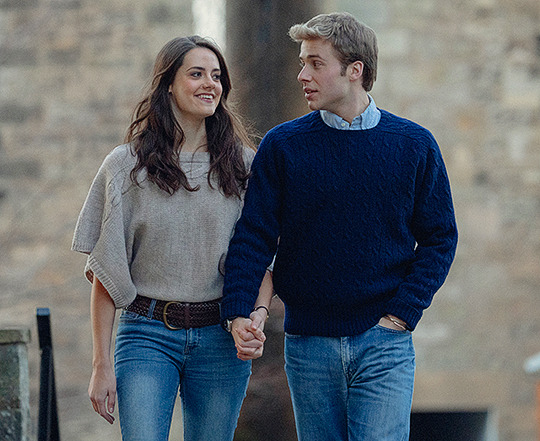
^ Kate 'n' Will. Her Mum would frame this picture.
Ep 8 'Ritz' plays like a standalone film. Margaret's final story is touching, but upsetting, at times; I was a fan of Diana, yet sobbed as much for Margaret as the credits rolled, even though her eventual death isn't shown. In fact, her final goodbye is sensitively done and stands as a fitting tribute to the princess, as well as to the Queen.
Lesley Manville makes Margaret's predicament so real as her health slowly breaks down. She bounces back from one stroke, then another hits. How awful too for Elizabeth to watch a much-loved sister deteriorate, though it was wonderful to see Lilibet read Margaret a bedtime story. It brought out the warmer side of Staunton's Queen.
The scene where Margaret scalds her feet in the bath is genuinely horrifying. I've suffered from ill health and loss of control myself and this was so much worse. I could feel her pain. That poor woman.
Human moments are where The Crown excels; through this episode, this working-class lass from a council house could somehow relate to a Princess in a palace. Peter Morgan has surely done more to humanise the royal family than any P.R team ever could.
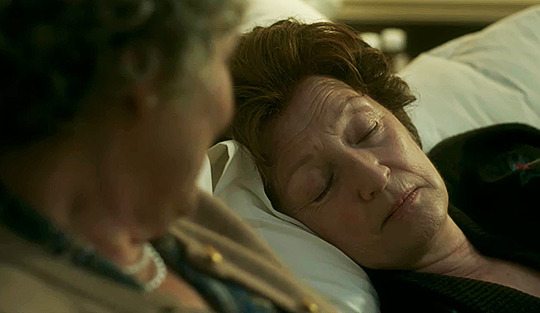
^ Fans of Margaret (and Lesley Manville) prepare yourselves for her sad final journey.
Onto the big reveal: when I mentioned at the start there are FOUR ways Queen Elizabeth appears – this is what I meant:-
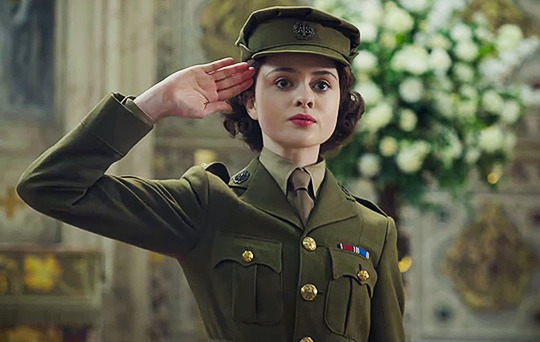
^ Newcomer Viola Prettejohn plays teenage Princess Elizabeth.
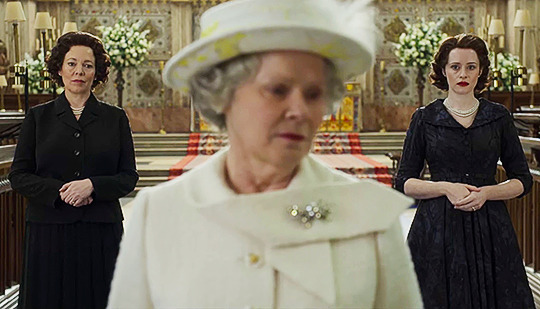
^ & there's Olivia Colman & Claire Foy alongside older Queen Imelda Staunton.
Satisfyingly, all 3 of The Crown's leading ladies return to close the show. Olivia Colman and Claire Foy each have an additional scene, too (I won't spoil the entire finale, as it covers a lot of ground in over 70 mins, but Olivia and Claire aren't back as 'ghosts.')
As we get older, the ghosts who speak loudest are our own; the former versions of us we berate ourselves with. Not everyone may warm to the Queen (sort of) talking to herself, but personally, I was thrilled to see these talented actors on screen together.
Foy's scene with Staunton is particularly effective, as the younger Queen gives her older self an old-fashioned dutiful talking to. It's somehow also credible that they're aspects of the same person.
It reminded me of Peter Morgan’s 2013 (extraordinary) play, ‘The Audience', which inspired this series, and included scenes where Helen Mirren shared the stage with young Elizabeth. That play is also why this theatre-fan started watching The Crown to begin with, and later went on to create this website.
When Ep 10 finished playing, my Netflix returned itself to Season 1. 60 episodes over 7 years! I will miss the grand scale of The Crown, but appreciate the legacy which remains. Now feels like the right time for this story to end. A full-circle moment in more ways than one.
**Majestic thanks for reading, and to every person who has liked, reblogged, messaged, supported The Crown TV for all these years.
💎♕You each deserve a Crown of your own!♕💎**
N.B: These are my humble opinions at this point in time. No offence is intended. Agreement = lovely; not compulsory. Disagreement = happens; kindly coexist. Ta!
#the crown#queen elizabeth ii#imelda staunton#princess margaret#lesley manville#tony blair#bertie carvel#william and kate#ed mcvey#meg bellamy#viola prettejohn#claire foy#olivia colman#reviews#articles#season 6#pt 2#gifs#the crown spoilers
83 notes
·
View notes
Text
What is your favourite Doctor Who story?

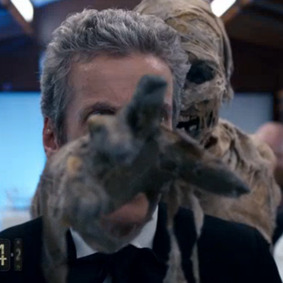
TOURNAMENT MASTERPOST
synopses and propaganda under the cut
City of Death
Synopsis
While taking in the sights of Paris in 1979, the Fourth Doctor and Romana sense that someone is tampering with time. Who is the mysterious Count Scarlioni? Why does he seem to have counterparts scattered through time? And just how many copies of the Mona Lisa did Leonardo da Vinci paint?
Propaganda
even if your not a classic who fan, you have seen moments from this, “wonderful butler, he’s so violent”, “youre a beautiful woman, probably”, “if you wanted an omelette I’d expect to find a pile of broken crockery, a cooker in flames, and an unconscious chef”. The location shooting, iconic, the music, iconic, the plot, so iconic I was once watching something (non doctor who) that referenced it as a fake historical event. Dare I say duggan is the greatest side character of all time. Romana’s outfit, the design of scaroth, the implication time lords can fly. it’s not my favourite overall, but its damn near close, it deserves AT LEAST the semi finals, AT LEAST. If you’ve not seen it or any classic who, go watch it, its so good, one of the best of the era. Also, how could I forget, the most watched episode on broadcast out of all of doctor who, including new who. (yes it was because itv was off the air due to strikes, but im glad its this episode that holds the record) (anonymous)
Mummy on the Orient Express
Synopsis
After their previous trip to the moon ended on a sour note, the Doctor decides to take Clara on a final trip in the TARDIS - ""our last hoorah!"" The destination? There have been many trains that took the name Orient Express, but there's only ever been one that traverses space!
However, they find their luxury trip may take an unexpected turn when they discover there's a supernatural passenger...
Propaganda no propaganda submitted
34 notes
·
View notes
Text

“To place my life in your hands, even if my end is death, is something I’ll never regret.”
I started this one the day the license was first announced in July and then the next week my life went to shit and it took me full 6 months of countless redraws and frustration to get to the finish line 🥹🥹🥹 I couldn′t look at it for few months, but I′m back to loving it now 🥹🥹🥹
More details and explanations under the cut! Because I have so much to say about it! Hehe
Everything in this art is hand drawn. The windows, the wisteria, and more importantly the patterns! I went looking for recreations of Sui dynasty clothes and made my own patterns based on those. One day I want to draw them in actually historical clothes of the era tho because the like, general wuxia clothes just arent accurate and I frankly kind of bland. Sui dynasty had such fun layering and insane colour combos! But I love how this one turned out, the patterns were what finally helped the art feel cohesive. The dotted pattern on his top robe hem is the only one I didnt make myself, its one of the default csp patterns.
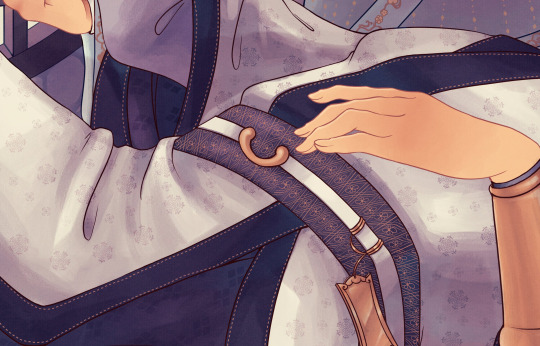
2. The colour scheme comes from my favourite of the Peerless covers, volume 4 of the traditional edition, lovingly dubbed the Blood licking cover. You know the scene 😳 (yes thats my own copy of the book)

3. Obsessed with how pretty Feng-er′s face turned out. His dimple 🥹 And the phoenix pendant Ququ got him at the end of the book. Ququ is actually wearing Feng-er′s coat in here and my headcanon is that Feng-er loves flaunting the pendant. He loves it so much
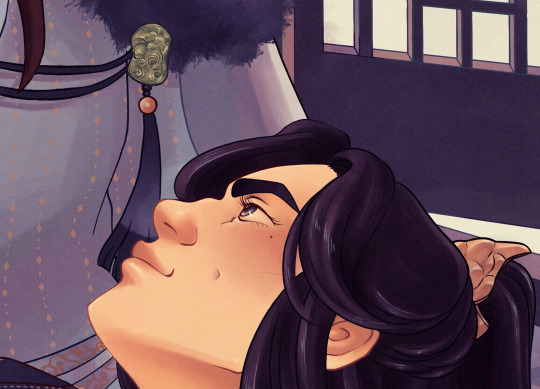
4. Ququ′s under eye bags 🥹🥹🥹 let that boy rest. Mwah. Also not so much fun fact, halfway through the art, I completely erased his whole head and drew it again and completely different because it was bothering me so much lmao. This one is SO much better
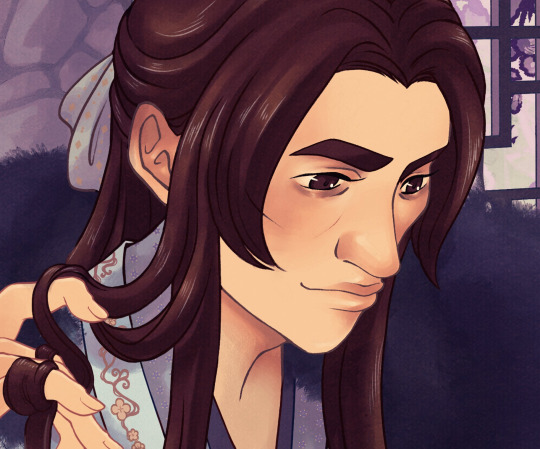
5. So I have this running joke where every time I draw book characters holding a book, I always add in the text a meaningful scene related to them. So here it′s the scene early on in the cave where Ququ tells him he thinks he's beautiful, but also insufferable and nobody could ever fall in love with him. Heh. Put on this clown wig, Ququ. Honk honk.
Also while my chinese studies are very much postponed rn, I do have a lot of training in japanese and yknow I actually missed writing in characters so much. Surprisingly therapeutic. Need to get back to it.
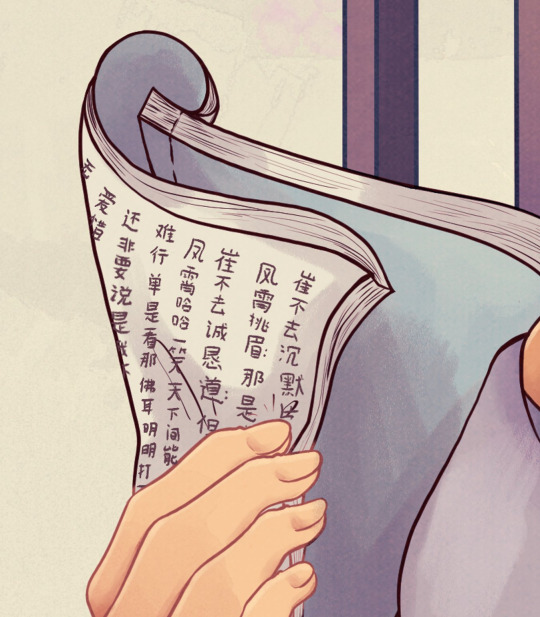
Anyway if you somehow made it here, wow! Thank you! I love you!
#Peerless#Wushuang#无双#FengCui#meng xishi#feng xiao#cui buqu#yknow i COULD probably go on. like about how much i actually LOVE drawing these kinds of latices. insanely therapeutical. very calming#also this wisteria brush was so much fun. lovely to use#honestly this didnt do much on twitter which sucks but also none of my art nowadays does much on twitter so i guess thats fine#as long as i have my 6 peerless freaks im fine
16 notes
·
View notes
Text
I just realised I’ve never written anything about the etymology of China Sorrows as a name. It’s maybe one of my favourites in the entire series.

I’ve seen theories before that her first name is synonymous with porcelain, for her paleness and fragile, delicate features. My preferred etymology for her taken name, though, comes from a slightly more obscure, archaic definition of the word.
From the early 16th century onward, china was sometimes used to mean a colour, rather than a place.

The word china, in an historic context, referred to several different shades of pale blue; these colours were given that name because they were originally associated with the light-blue glazing found on imported Chinese ceramics.
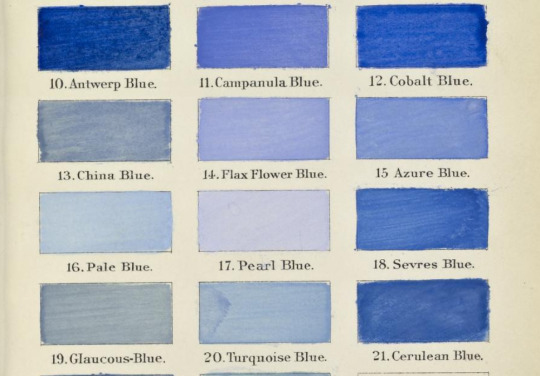

That ice-blue, china-blue, is the colour of her striking, unusual eyes. I love the idea that this definition is why she chose it as her name.

The other part of her name also carries a second, hidden meaning. Rather than just a synonym for sadness or grief, the use of Sorrows seems to be a deliberate Irish literary reference. Deirdre of the Sorrows is one of the most famous characters in ancient, pre-Christian Irish mythology.
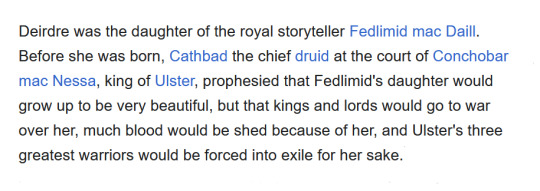
In the Ulster Cycle of stories, Deirdre is fated from birth to become the most beautiful woman Ireland has ever seen. But that same prophecy curses her to a life of tragedy, predicting that she will eventually lead her lover to his death, and drag Ireland into war, bloodshed, and chaos.
This is where her epithet comes from; her name is forever linked with loss and destruction.
(The story was probably first written down around 600AD; the earliest extant written copies date to the 12th century, so it’s entirely possible for China to have been familiar with the story while taking her own name, as a teenager, in the late 16th century. )
The mythology is canon relevant in terms of both foreshadowing China’s magic - she has the same ‘gift’ of strange, almost otherworldly beauty as Deirdre - and her war-era backstory with Skulduggery, the former lover she draws into a trap that ends in his death.
39 notes
·
View notes
Text
Snape Asks
Do you have a snOTP? What is it?
Sure, Snape x [First name] (specifically my OC) haha
2. What do you think is Snape's favourite colour and why?
Black? Like...obviously. You think he'd wear so much of it if he didn't genuinely like it?
3. Which Disney character, according to you is most like Snape?
Scar. I don't think there's another answer.
4. Do you think Snape remained a virgin?
I hate this question. Absolutely NOT. The dude was guilty about his best friend's death, it doesn't mean he never had sex. The only way he would have is if he were fully asexual (which, to be fair, seems possible).
5. Do you think Snape ever loved anyone other than Lily, romantically or platonically?
Romantically, no. Platonically, I think he loved Dumbledore and Draco.
6. If Snape learnt another language, which would he choose?
Latin, doy.
7. Which staff member do you think gets along well with Snape?
Dumbledore. I don't think he and McGonagall were friends, despite the fluffy popular head canons. Mutual respect, sure, but not friendship. Otherwise, I don't see him hanging out with any other staff.
8. If you had to assign Snape to a house, which one would it be?
Slytherin. No question. Dude was immensely ambitious.
9. What are your personal headcanons on Snape's diet and favourite foods?
I think eating was a chore for him. He probably had one favorite meal at any given time and it was all he wanted to eat. It'd change monthly. Sometimes he'd have a bread-and-cheese month, sometimes he'd have an eggs-and-bacon month. Otherwise he'd forget to eat.
10. Do you think Snape's character has changed the way you think/feel about others?
Yeah, I mean I hate James Potter. That's more because of the Marauders stans though. What a toxic community.
11. Your favourite scenes with book/movie!Snape?
Literally every book Snape scene.
12. If you had to chose a Golden trio era student to be Snape's friend, who would it be and why?
Luna.
13. Do you think Alan Rickman contributed to your love for Snape?
Yeah, but I loved book Snape first.
14. What do you think is Snape's favourite potion to prepare?
Probably changes based on the month. Whatever's fascinating him at the moment. Something complicated and finnicky, definitely.
15. If Snape had any free time, how do you think he would spend it?
Reading, drinking wine, doing up his buttons, smoking.
16. Were you ever a Snater? How and when did you become a Snover?
God no. I have taste.
17. Do you think Snape was unhappy even after joining the DEs?
Yes, definitely. I don't think it ever gave him what he was looking for.
18. Your favourite physical feature of Snape?
Eyes.
19. According to you, what is Snape's biggest flaw?
Being a dick for absolutely no reason. Lack of chill.
20. Why do you love Snape so much?
He's powerful and brilliant and misunderstood. He's also a weird sexy feral emo boy. He's also a professor and like...sheesh.
21. What particular memory do you think Snape used to conjure his patronus?
Something with Lily obviously. Could be anything. The day they met, hanging out by the Black Lake, laughing in class. It probably changes.
22. Do you think Lily was a good friend to Severus?
Not really. Maybe when they were kids, but once she started hating his friends, there's a real sense that she thought she was too cool for him.
23. What do you think Snape wore under his robes?
Dude what? Trousers.
24. Do you think Snape ever self-harmed?
I don't think he'd see the point.
25. Is there any other character you love as much as Snape? Do you think they'll get along?
Yeah. And no, they absolutely would not get along.
26. What genre do you think Snape preferred to read?
Crime, thrillers, non-fiction, historical fiction, maybe some horror
27. Do you think Snape was close to his mother?
No. I think he was disappointed by her. But he loved her more than he loved his dad.
28. Do you think you'd like being taught by Snape?
Only if we were fucking. Otherwise, from what I've seen he seems like a pretty lazy and demanding teacher.
29. How do you headcanon Snape's bedroom would look like?
Queen bed with dark sheets, a few bookcases, a desk and reading chair.
30. If you could give young Snape any advice, what would it be?
You're better than your origins. James Potter sucks--rise above it. And don't listen to the fucking Death Eaters man, come on. Dark Arts aren't the only magical mysteries left.
31. Do you think Snape had any mental illnesses? Which ones and why?
Yeah, dude. If the guy wasn't depressed I will eat my fucking hat. He was probably anxious as hell too. Maybe on the spectrum.
32. If you could change Snape's middle name to be something other than Tobias what would you choose?
Do people have opinions on this?
33. Top 3 songs you think will show up in Snape's most played?
There Is a Light That Never Goes Out - The Smiths
The Killing Moon - Echo & the Bunnymen
Bela Lugosi's Dead - Bauhaus
34. Do you have any Snape NOTPs?
I hate Snape x any of the Potters. Lily, James and Harry need to back off. Haven't they put him through enough?
35. Snapey BROTPs?
No, I want my man lonely and annoyed.
36. Did Snape get sick often? Your headcanons for when he was sick?
I don't think OFTEN. He'd definitely refuse to go to the hospital wing and brew his own cures. Probably worked when he was sick too. Stubborn ass.
37. Snape didn't pay attention to his physical appearance, but if you had to choose a part he would take care of, which would it be?
I disagree, I think the dude knew how to dress. I also think he cleaned his nails.
38. Which type of weather does Snape prefer?
Gray and cool.
39. How do you think Snape spent his early childhood days?
Hiding from his dad, finding joy where he could.
40. Other than Lily, who do you think impacted Snape's life the most?
Dumbledore. I think Narcissa and Lucius did too. Probably some of his DE friends--Mulciber springs to mind.
41. Is there a side to Snape that he hasn't let anyone see? What do you headcanon this "secret personality" to be like?
I don't think he laughs in public often. I think you'd have to be really close to see that.
42. Do you think Snape cried often?
As a kid and teenager, yes. I think at some point those tears dried up though.
43. What's your favourite headcanon about Snape?
He's actually a good professor and not as ugly as Harry seems to think.
44. Is there a movie/song/book that reminds you of Snape?
Tons of songs remind me of him. Sunburn by Muse will forever be the Broken Silence anthem.
45. What mode of magical travel would suit Snape the best?
God, anything but a fucking broom.
46. Your opinion on Snape's sexuality?
Realistically, somewhere on the demi spectrum. Possibly ace. In my head he's like a dom, bi-curious brat tamer though.
47. Which of the Marauders do you think Snape could have gotten along with?
If there was ever even a SHOT it would have been Lupin. The least awful of them.
48. How many points do you think Snape would've awarded during his career?
Sounds like he awarded a lot to Slytherins. Uncountable.
49. Did you feel Snape was the "good guy" even before the reveal?
Yep. I never lost faith.
50. Do you prefer tall!Snape or short!Snape?
Tall.
51. Had Snape lived, would he continue teaching at Hogwarts?
ARE YOU JOKING? ABSOLUTELY FUCKING NOT.
23 notes
·
View notes
Note
24 and 25 for the history ask?
24: Who do you consider to be one of the most underrated historical figures?
edward vi. henry vii and mary i are rightfully recognised and understood as similarly underrated in comparison to their successors, but they do have their advocates - unlike edward vi. i've encountered a lot of tudor enthusiasts, and nobody ever lists edward as their favourite tudor or favourite historical figure. of course, he died as a child and spent a good half of his reign with limited input into how he ruled, but in his short life he achieved a remarkable amount of change, plenty of which was his own work.
edward's legacy is hugely unfair. he's remembered, for the most part, as a sickly and weak child overpowered by the cruelty of his regents. but this is, in my opinion, a terrible way to view him. he was powerful. he was intelligent. he was raised to rule. he managed to handle his uncle kidnapping him; he helped shape what would have been the future of english protestantism; he began trying to solve the huge amounts of debt that his father and uncle had left him in. the main reason he is not remembered as an efficient king with a powerful and skilled advisor by his side (john dudley may not have been the most consistent person around, but i think his legacy also got fucked over by edward's untimely death) is that he died young. had he lived, he might have fathered an heir, finally secured the tudor succession (a problem which remained essentially unsolved across the entire period), fully established a church of england, reduced the financial problems of henry viii, and perhaps become involved with colonialism across the seas. (not that that's a good thing, but elizabeth i isn't exactly shunned for her involvement in ireland...)
and most of all, edward was human. he was a teenager with his own thoughts and feelings, ranging from his turbulent and tragic relationship with his sister, mary, to his grief over the death of his mother. he was orphaned at the age of nine. two of his uncles were beheaded when he was only eleven and fourteen respectively. he was overcome with sorrow when his friends, the dukes of suffolk, died. he once wrote of mary: 'i love you most.' but at christmas in 1550, they got into a row and made each other cry because they couldn't reconcile their religious beliefs - mary refused to bow to edward's religious changes, and edward was frustrated that mary insisted he was too young to know his own beliefs. he was close friends with lady jane grey, whom he later tried to make his heir. and he was fifteen! he died slowly and painfully, over a period of six months, and he was a teenager who knew that his entire life's work might be undone by his sister. he was stubborn, he was clever, he was deeply religious - all traits for which his sisters and father are well-known, but edward is denied. i want a proper drama focusing on edward's life, and NOT his annoying uncle or elizabeth, stat.
i was going to say something about margaret pole and arthur plantagenet here, but i got sidelined by my love for edward here. arthur was the illegitimate son of edward iv (who, funnily enough, died in the tower of london), and margaret was the daughter of george, duke of clarence, and niece of edward iv. neither of them were particularly important in edward iv or richard iii's reigns, but they later became much more relevant in the tudor era, as relatives of elizabeth of york and then henry viii. under henry viii, arthur was viscount lisle and lord deputy of calais - oddly enough, after his death, his title passed to john dudley, who was his stepson. margaret was mary i's governess, and her family remained staunch supporters of katherine of aragon. despite refusing to accept mary as his heir, henry apparently considered women a legitimate threat to his rule, as he executed margaret in 1541. earlier, he also arrested arthur. arthur was supposed to be released, but he died a few days after being freed, probably from a heart attack. they're the real last plantagenets.
i'll stop there, else this post will end up miles long.
25: Who is the most overrated historical figure, in your opinion?
stalin. elizabeth i. other people who weren't involved in colonialism, probably. oh yes! anne boleyn. we have all heard of anne boleyn, we get it, she was a person who existed. the actual woman anne boleyn seems really interesting, but unfortunately it gets buried under leagues of people more interested in either her romance with henry viii (boring) or people who simply wish to one-up those who aren't interested in her specific area of history. i am genuinely fascinated by henry viii, but i'm exhausted by the constant emphasis on anne boleyn this, elizabeth i that. i'm not interested in them!! i don't care!! but they're everywhere and fans of anne boleyn seem to feel oppressed for caring about an incredibly popular historical figure. not that anne wasn't treated with a lot of cruelty by henry viii and a lot of catholics both at the time and after the fact, but is there any historical figure except maybe her daughter who saturates all things tudor? i doubt it
(link)
17 notes
·
View notes
Text
DOCTOR WHO TOP 10 - 11th Doctor
My favourite of the New Who Doctors. I started with his era and it changed my life.
10. The World Tree
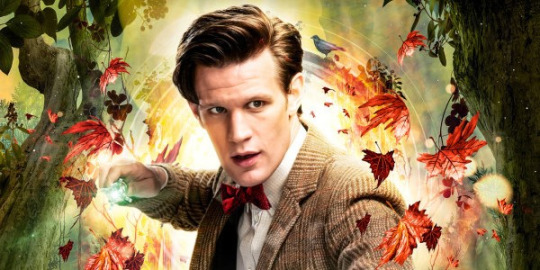
A recent addition to this Doctor's EU canon, I utterly love this little story. It's another winner of the Paul Spragg Memorial, so you can download it for free on the Big Finish website. I urge you to do so.
9. The God Complex

Having previously written School Reunion and Vampires of Venice, I presume Toby Whithouse's reputation in the Who fandom was something along the lines of "he writes the fun, fluffy ones". The God Complex is his first darker and, well, more complex script. And it really, really works. I have a soft spot for most of his episodes anyway, but The God Complex is probably the most ambitious one. I adore the visceral liminality of that hotel, it's so good. (Also, I choose to ignore that nonsense reveal in The Time of the Doctor.)
8. Apotheosis / The Child of Time
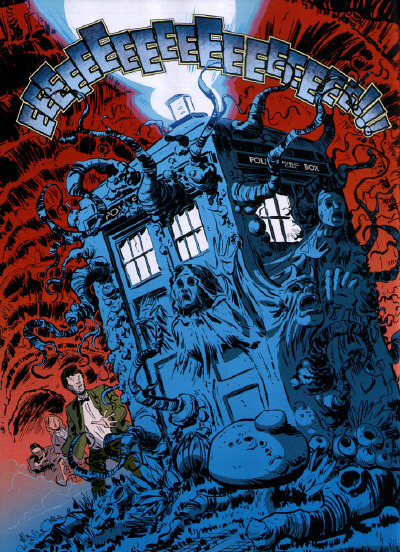
These two basically form a two-parter, so I'm putting them together. Although, for the record, I prefer Apotheosis, contrary to what Jonathan Morris presumes in his commentary at the end of the comic strip collection. Mostly because I love Dan McDaid's art so bloody much, but also because of the atmosphere, setting, clever use of the medium (the stuff with the beard ROCKS), and nuns with guns. But The Child of Time is also pretty great as a big, satisfying finale full of fun twists. I said it before, I'll say it again - Morris is a great chameleon, perfect at writing excellent Doctor Who stories while using voices of other excellent Doctor Who writers. I mean, he admits in the commentary that he wanted to get the strips close to Moffat's style and I think he definitely succeeded.
7. Amy's Choice
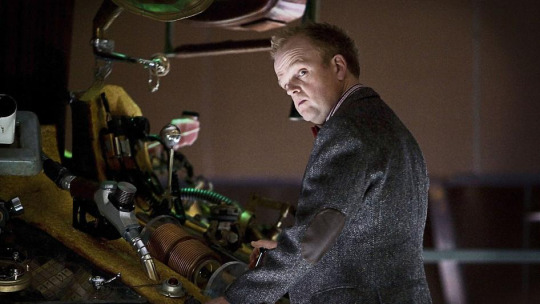
It's a shame Simon Nye never wrote any more Doctor Who, because Amy's Choice is a stellar character piece. Toby Jones' Dream Lord is such a memorable presence and the connundrum this episode presents is really fun and unique.
6. Space in Dimension Relative and Time
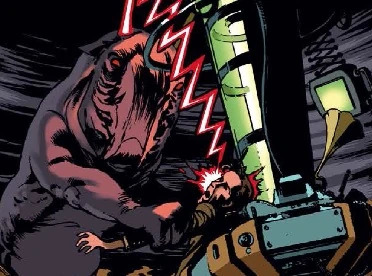
one best the is it but One Year Doctor's eleventh in one-shot experimental only the not It's. clever really, really it's yet, simple It's. it read go all should you and story timey-wimey unique and fun really a in potential full it's to medium the uses Williams Rob.
5. The Eleventh Hour
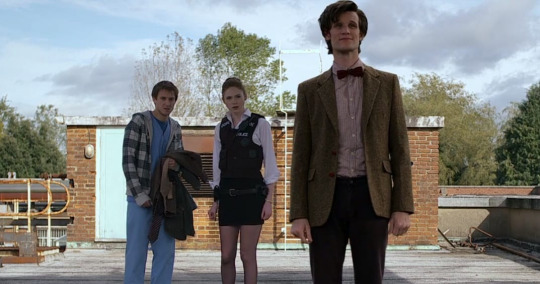
The episode that hooked me. The episode that changed my life. I fully believe this is the best episode to show to someone new to Doctor Who.
4. The Rise and Fall / The Other Doctor
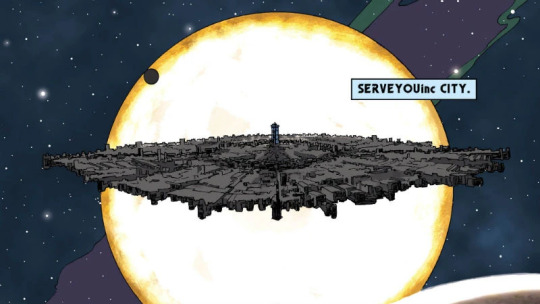
A two-parter, with the first part written by Al Ewing and draw by Boo Cook, and the second part written by Rob Williams and drawn by Simon Fraser. I've only read Year One of eleventh Doctor's comics published by Titan, but I strongly feel the story of the Doctor taking on SERVEYOUinc. In a way, the story feels like a conversation not just with Doctor Who's past and present, but also with it's future... It feels like the perfect antidote to Kerblam!.
3. The Day of the Doctor (and The Day of the Doctor)

Listening to Steven Moffat talk about The Day of the Doctor is weird. Everything around the writing and production of the 50th anniversary special seems like hell. And yet, the end result is something that's not just extremely good Doctor Who, it feels like it knows it's good Doctor Who. It looks simple, seems self-assured, appears to know exactly what it's doing. It's a minor miracle. And it's also amazing. Gallifrey falls no more. All thirteen and all that.
Note: This spot is shared between the episode AND the novelisation. I love both of them very much. Go read the novelisation if you haven't read it yet. It's really, really fun.
2. Vincent and the Doctor
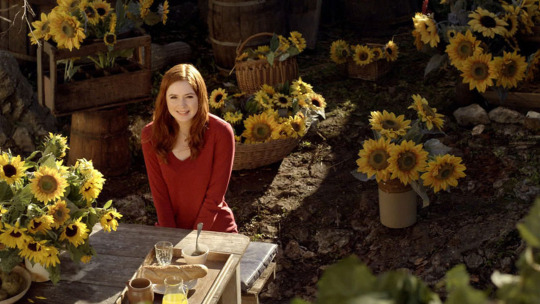
Nearly everyone loves this episode and, well, I can't really argue with that. It really is special. I adore it, the greatest celebrity historical the show ever did.
1. The Doctor's Wife

My favourite New Who episode.
So, I am a huge fan of Neil Gaiman. That is probably not a shocking take on this website. My collection of his work currently includes 12 books (1 in Czech translation, the rest in English), 6 comic books (1 in Czech translation, the rest in English), and 1 script book. I love Neil Gaiman.
I love the idea of the Corsair. I actually roleplayed as an incarnation of the Corsair in a game of Cubicle 7's Doctor Who TTRPG at a Red Dwarf convention recently. In front of an audience of like four people.
Hell, I even made a fanart of the Nephew like 6 or 7 year ago. I love the poor Ood and I love the horror aspect of the episode, with TARDIS becoming an abject and unfamiliar place when she gets possessed by the House.
But the reason I love this episode the most out of not just the eleventh Doctor's era but all of the 2005 series is... Well, it's the relationship. The Doctor and his TARDIS. Or, the Thief and his Sexy. It recontextualizes the whole mythology, it recontextualizes the entire series in a way that's so moving and poetic and just... perfect. I love The Doctor's Wife.
7 notes
·
View notes
Text
Okay, the little “History is…” talk in the new Amelia Project is making me emotional. Because, as a history buff, my absolute favourite part of history IS the people and the individual stories! One of my favourite things is to read the correspondences of people who never thought that their stories would ever be worth telling or would be important to the historical record.
“History is just wars and dates.”
“No. It’s people! It’s like… it’s like… what is it like? It’s like reading sci-fi but instead of the future it’s the past. But it’s still all stories and cultures and people and they’re different and you never really meet any of them-“
It’s such a lovely way of putting it. And, as Kozlowski points out, the past is still tangible and still impacts and exists in our modern world. Even if it bears little resemblance to what it once was 100 or even 500 years ago. Wars and dates are how we categorise the past, what we define eras by. But it does not give an accurate representation of the living, human parts of the world. How people still played practical jokes, how cultures were evolving or clinging to stay alive, or how for all of time people have always been here just as we are now. Just in different settings. And you know what, that’s beautiful.
The past is horrific and brutal and ugly. It’s also inspiring and worth remembering the stories that make it all up, the threads in the tapestry that is continuing to be woven. It’s about significant names such as Moliere and his death but it SIMULTANEOUSLY about the joy of that one day you found the perfect waffle.
#sorry for kinda going off#but I’m a massive history buff#(if you follow me on main you know this)#and it kills me whenever ppl disregard the past as Just Dates#or as being ONLY about the major events and Important People#so maybe I’m just reading WAY too much into this#but sometimes history is just about the joy of a good waffle#:’)#the amelia project#what ALSO kills me is that a lot of the people who I’m extremely interested in knowing the stories of weren’t literate#or what they did leave behind for the future is destroyed#never think something is unimportant in history#I promise you there will always be at least a handful of people who devote parts of their lives to wanting to know more#who become enamored by your story about dealing with the postal service in 1810#it’s human to connect#mundanity is what allows us to connect most deeply with people from hundreds of years ago#history
31 notes
·
View notes
Text
On the Epic of Gilgamesh: The World's First Big Budget Adaptation
My Yuletide assignment this year was an excuse for me to reread (and rediscover everything I loved about) The Epic of Gilgamesh ‒ and I can seldom resist the excuse to ramble about this kind of thing, but where do you even start, with a work like Gilgamesh? It’s the world’s oldest (known) work of literature, it features an all-but-canon m/m romance, and (even from incomplete reconstructions from languages which have been dead and alien for millennia) its central themes and most striking imagery still resonate to this day.
But perhaps my favourite thing is that it’s also what amounts to the world’s first ever big-budget adaptation of an existing story, complete with extra of sex and violence, a tropey bromance between its male leads, gratuitous cameos from other popular mythic figures, and even this one wonderfully confusing deleted bonus-scene, tacked on at the end like a DVD extra. I’m not even kidding.
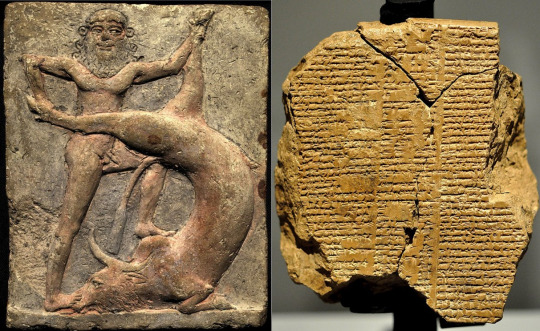
Let me explain.
The oldest surviving stories about Gilgamesh – a semi-divine, semi-mythical Sumerian king – were inscribed on clay tablets in ancient Mesopotamia (modern day Saudi Arabia) somewhere around 2000 BC. Five distinct poems from this era have survived in variously-complete format. Gilgamesh and Akka tells of how Gilgamesh gained independence for Uruk from the kingdom of Kish (ruled by the titular Akka, in what seems to be the one Gilgamesh tale most likely to have some real historical basis). Gilgamesh and Huwawa and Gilgamesh and the Bull of Heaven both recount his battles with their respective monsters. Gilgamesh and the Netherworld deals with the death of his servant Enkidu, whose shade is briefly allowed to return to the mortal realms to report on what awaits in the hereafter. And finally, The Death of Gilgamesh deals with Gilgamesh’s death from illness, the gods decreeing that semi-divine isn’t sufficient for immortality.
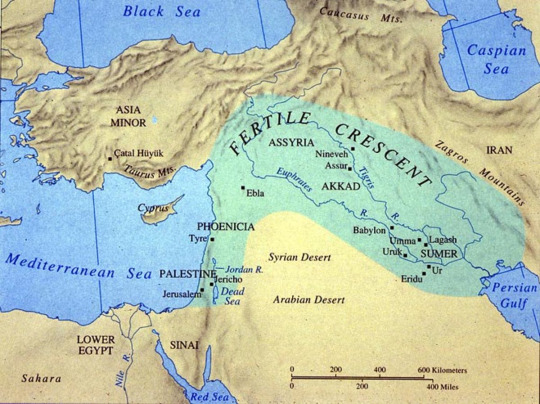
But these aren’t the best-known version of Gilgamesh. A few centuries later, someone took those existing tales and reworked them into a single, cohesive epic, spanning 11 tablets (plus one confusing bonus tablet that we’ll get to later on). The new, integrated epic promotes Enkidu from merely a servant to Gilgamesh’s equal: created to be his companion by the gods, in answer to prayers of the people, exhausted by Gilgamesh’s tyrannical rule.
In all the best traditions of modern shonen manga, Gilgamesh and Enkidu meet, fight, and then become fast friends. Together, they battle both Humbaba and the Bull of Heaven, in episodes only lightly reworked from the original poems. But this time, these acts anger the gods, and their punishment is Enkidu’s death. Distraught at the loss of his friend, and faced with the horror of his own mortality, Gilgamesh goes on a quest to find the one man the gods ever made immortal: Utnapishtim, the Sumerian Noah (our gratuitous cameo). But Utnapishtim can only tell Gilgamesh that, short of saving the world from another biblical flood, his quest is a fool’s errand. Finally accepting his own mortality, Gilgamesh returns home. (This is, of course, a very summarised version of the full epic, but you get the general gist.)
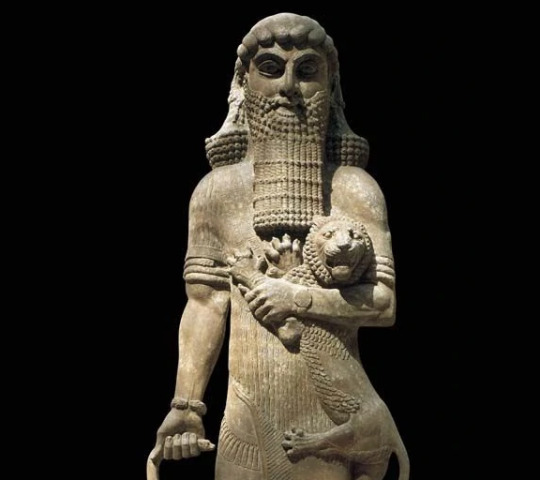
Comparing the epic to the ‘original’ poems can be a little fraught, considering that even after reconstruction from multiple different partially-preserved copies, there are still gaps in both versions. We can only speculate whether there might have been other Sumerian poems that haven’t survived ‒ let alone how many other variations existed in oral tradition throughout the region and beyond. But for all the epic version adds and changes, what stands out most is how they’ve picked up and expanded on what was already the strongest running theme of the Sumerian stories: mortality – whether that be the desire to leave behind a record of great deeds to be remembered by (such as the slaying of monsters), or more explicitly in those final two poems, dealing with Enkidu and Gilgamesh's deaths.
For all that’s been added, the promotion of Enkidu to Gilgamesh’s equal does have more basis in the Sumerian originals that it might first appear. Though explicitly only 'a servant', Enkidu is the only other character appearing (or at least mentioned) in every poem, aiding his king in his struggles against Humbaba and the Bull of Heaven. In sending Gilgamesh to the netherworld upon his death, the gods even note that he will be reunited with his ‘beloved’ Enkidu, whose death he so fervently mourned. And though everything else in the circumstances of Enkidu’s death has been changed, both versions render it a major event, and one that leaves Gilgamesh heartbroken.
There’s even a trace of epic!Gilgamesh’s tyranny in Gilgamesh and the Netherworld, where he so exhausts the men of Uruk with his games and contests (similar accusations to the first chapter of the epic) that the gods themselves step in, arranging for his favourite toys to fall through a crack in the earth into the Netherworld (prompting Enkidu to volunteer to retrieve them… and you can see where this is going).
But for all the adaptation takes from those old poems, some of its most striking chapters are (as far as we know) completely new – including all of Enkidu’s backstory. The Gilgamesh of the epic is still respected as a wise and powerful ruler, and he still exhausts the men of Uruk with his contests, but now, he’s also been asserting his right to droit de signeur (yes, really – that trope goes this far back), and his people aren’t happy. The gods’ solution is to make the semi-divine Gilgamesh an equal: Enkidu the wild man, raised in the wilderness by beasts. Nearly as huge and powerful as Gilgamesh himself, Enkidu soon becomes a problem for hunters trying to make their living nearby.
How do you solve a problem like a wild man? Well, obviously, you introduce him to sex.
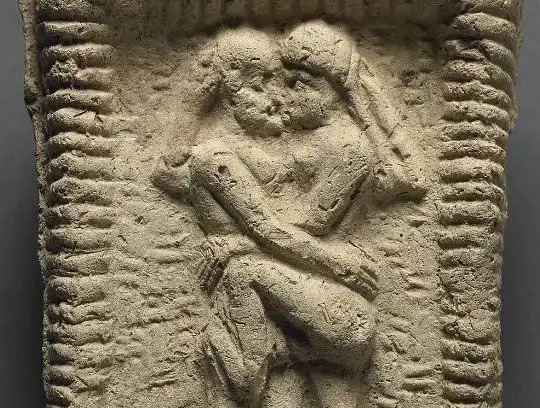
Gilgamesh’s solution to the Enkidu-problem is to send Shamhat, a cultic prostitute of the temple of Ishtar (ritual sex was apparently a Big Thing in some ancient fertility cults) – and it works. After a full seven days of sex with Shamhat (look, this is why you send a professional), Enkidu finds he can now understand the language of men, but the wild animals reject him. Something stirs in him when Shamhat tells him of Uruk and Gilgamesh, but the tipping point comes when he learns Gilgamesh is due to make a scheduled appearance at an upcoming wedding (ifyouknowwhatimean). Enkidu rushes to Uruk, intercepts Gilgamesh on the very doorstep of the bride in question, and the two demi-gods proceed to throw down. And then become instant BFFs. Seriously, I wasn’t kidding about how very Shonen Jump it is; I don’t know what else to tell you.
Now, to what degree these new intro chapters were an excuse to sex things up and get the audience’s attention, I can only speculate – but there is a lot of sex in these first two tablets (and next to none afterwards). Regardless, this feels like the perfect place to segue into what for many will be the more pressing question: just how gay is the Epic of Gilgamesh?
Because I mean, just on a surface level, it’s already pretty suggestive: Enkidu, having newly discovered sex, shows up to pointedly cockblock Gilgamesh’s appointment with a young lady, and one round of (ahem) "wrestling" later, suddenly they really like each other. And the mere fact the gods’ solution to "this guy keeps exhausting all our men and fucking all our women!" is to send him Enkidu… you’ve got to wonder if he’s just a wrestling partner on Gilgamesh’s own level, or is he meant to satisfy other needs as well?
But you really don’t need slash-goggles to find subtext in this tale. Even the academics are here for this one.
Significantly, Enkidu’s coming is foretold to Gilgamesh in a series of prophetic dreams, helpfully interpreted for him by the goddess Ninsun, his mother. In the first, Enkidu is represented by a meteor that falls down before Gilgamesh – and to quote George’s translation directly, Gilgamesh recalls, “Like a wife I loved it, caressed and embraced it.” This is not what you'd call ambiguous wording. His mother corrects this only in that the meteor is to be a man – and to drive this point home, Enkidu spends much of the rest of the poem being described as having strength “as mighty as a rock from the sky.” If that wasn’t all suggestive enough, one might also note that Enkidu does his share of “caressing and embracing” (that same wording, presumably going all the way back to the original language) of Shamhat during their week-long sex marathon too.
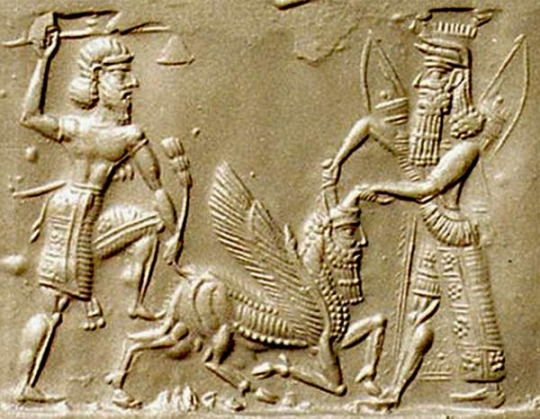
Then Gilgamesh has his second dream – almost beat-for-beat identical to the first, except that now Enkidu appears as an axe rather than meteor. This is a little more confusing. Both are certainly dangerous objects which hit hard, but axes don’t generally fall from the sky, and Enkidu is never compared to an axe again. So why include it?
The most compelling (and really the only) academic explanation I’ve seen put forward is that both objects may be playful Akkadian puns. Kisru (meteor) evokes kezru, and hassinu (axe) evokes assinnu – and both kezru and assinnu are apparently terms for types of male cultic prostitute: men who have sex with other men. Lest you wonder if this might be reaching, that amazing “Like a wife I loved it” line is still right there. It all adds up.
Before we get too carried away with pre-historic queer representation though, it’s notable that even in a time where apparently no-one batted an eye at male cultic prostitutes, the Gilgamesh/Enkidu subtext would be left largely as the stuff of implication – but the pattern is also weirdly familiar. Like modern media adaptations from Sherlock to Captain America: Winter Soldier, it’s plain the screenwriters absolutely want to imbue their central male/male relationships with all the intensity and pathos (and maybe even a bit of wink-wink-nudge-nudge) of a romance, and yet stop short of making it explicit. I cannot begin to guess whether the same forces were in play here, but the resonance is still pretty striking.
We’re still not done with gay-Gilgamesh-shenanigans though, because we’ve still got to cover that mysterious, DVD-extra of a 12th tablet, which may-or-may-not include an actual, textual statement of how much Gilgamesh likes handling Enkidu’s dick.
This one is going to need some more context. See, the 12th and final tablet of the Epic of Gilgamesh consists of a fairly-literal Akkadian translation of the latter half of the original Sumerian poem, Gilgamesh and the Netherworld. Narratively speaking, this is a bit of a record-scratch moment, because not only has the epic already reached its logical conclusion as of the end of tablet 11, Gilgamesh and the Netherworld is the one that revolves around the death of Enkidu – and in the new epic version, Enkidu has already died in completely different circumstances, way back in tablet 7. So what the hell is it doing here?
The best guess as to why anyone felt the need to include this episode in its original form is that the bulk of the original Sumerian poem relays a detailed account of how one’s actions in life will affect one’s prospects in the hereafter. Enkidu’s shade dutifully reports that a Sumerian citizen who hopes to be comfortable in the netherworld must have plenty of sons (to make offerings in the name of their departed father), must show respect to the gods, must die peacefully – the list goes on. The material has transcended the world of poetry and moved into scripture – and that may have been considered worth preserving long after the original tales were lost.

So where does the dick-touching come in? Brace yourselves: Enkidu’s account of the netherworld includes some graphic details about what happens to your junk. That crotch you touched, so that your heart rejoiced, is filled with dust like a crack in the ground. And so on.
Here’s where making definitive statements about this passage get messy. There are at least two different versions (the original Sumerian and the one from the epic) in different languages, and not always preserved well enough that all the words are still legible. So I’ve seen translations where it seems to be Enkidu’s own body that Gilgamesh ‘rejoiced to touch’. I’ve seen versions where it seems to be some unnamed woman’s body instead. Or maybe Enkidu’s saying that even having a wank isn’t worth much rejoicing in the afterlife (and for the record, I’ve seen all the above in just the work of just one author, Andrew George. Consensus is not a luxury we have here). There’s some ambiguity there, and I have no idea how much of that is down to interpretation, translation, or the actual state of the text. The 12th tablet of the epic of Gilgamesh remains a mystery stuffed into an enigma (then presumably filled in with dust).
Anyhow, back to the main text of the epic. From the meeting of Enkidu and Gilgamesh, things happen surprisingly fast. Gilgamesh immediately proposes a trip to the cedar forest to slay the monster Huwawa: an act which so impresses the goddess Ishtar that she hits on Gilgamesh, he rejects her, and she sends the Bull of Heaven to punish him. Angered by the death of both Huwawa and the bull, the gods inflict a fatal illness on Enkidu, whose death leaves Gilgamesh heartbroken. Like screenwriters trying to cram everything from Captain America’s origin story to his emergence from the ice into a single movie, the complete tale of Gilgamesh��s time with his literally-god-given-soulmate seems like it’s been compressed down to maybe a couple of months, max. But such is the nature of adaptations like this one.
But the best parts of the epic are hardly over. Gilgamesh’s search for Utnapishtim, the one man ever made immortal by the gods, will see him meet scorpion men and stone men, will take him across a sea whose very touch is death, and force him to race the sun through the tunnel it takes each night under the earth. He finds the man he seeks at the end of the world – which is our poet’s excuse to include the entire Sumerian flood myth in the narrative, as Utnapishtim recites exactly what he had to do to earn his immortality.

Gratuitous as it may be, this is not a complaint. I kind of love the pre-biblical Sumerian version of this story – not least because, despite being initiated by the most revered of the gods, the deluge sent to punish mankind for their ills is unambiguously framed as a mistake. Mankind is saved only because Ea, wisest of the gods, sneakily breaks his oath of secrecy by alerting Utnapishtim to the danger and directing him to build his ark – and Ea gets away with it by directing his warning not to the man himself but to the fence outside his home, so he can honestly tell the other gods “Who me? I didn’t tell anyone, I only whispered it to a fence!” (I like to imagine him walking away from that initial meeting with the other gods rolling his eyes, going, “Well someone’s gonna regret this in the morning, you just wait. Alright, alright, damage control time…”)
And the gods absolutely do regret the deluge. When at last the rain stops, and Utnapishtim lights some incense in ritual thanks to the gods for his survival, the text describes the parched gods clustering around the smoke of the offering like flies. To find something like that – that comes so close to suggesting that the gods themselves depend on humanity for some measure of their power and comfort – in a text this old blows my mind a little. It’s also a hell of an image.

In any version of Gilgamesh, the general attitude to the gods has a lot of commonalities to what you’d find in, say, Greek mythology. The gods are absolutely divine and worthy of worship, but also come across as one huge, long-running soap opera of privilege, dysfunction and pettiness. Even the Athenians, though, generally kept the image of their patron goddess Athena reasonably clean. By contrast, when Uruk’s own patroness Ishtar appears in the tale, her role is to hit on Gilgamesh, be rejected, go crying to her father for help, and send the Bull of Heaven down for revenge. Gilgamesh insults her, kills the bull, and even hurls part of its carcass at her as a parting blow. He then makes flasks of its horns and presents them to her own temple in her honour. For bonus confusion, the original Sumerian Gilgamesh and the Netherworld also opens with a passage where Gilgamesh does Ishtar a much-appreciated favour in clearing out the demons infesting a divine tree. What on earth are we supposed to make of it all? The worship of Ishtar must have taken some truly god-level compartmentalisation.
Much as I love Gilgamesh, some of it is inescapably pretty impenetrable to the casual modern reader. If you were paying attention back at that very first bit about Gilgamesh and the Netherworld, for example, you might have caught that plot point where the great king Gilgamesh so exhausted all the men of Uruk with his games that the gods themselves had to step in and take his toys away. What those toys were isn’t totally clear, but the best guess seems to be a ball and a mallet. These were made of wood from that divine tree, but even so – was ancient Sumerian croquet really that intense? You’ll run into stuff like this a lot reading any version of Gilgamesh – scholars will do their best, but some of it just doesn’t translate, reminding you you’re reading something written in a cultural context no-one’s seen in over 4000 years.
But that only makes it all the more fascinating when (like finding bits of Shakespeare in the infinite monkey cage) you run into the stuff that does still resonate. I could not tell you why Gilgamesh begins his case for why they should rebel against Kish with a spiel about the digging and/or operation of wells – but then you get to the bit where Akka compares Uruk with its great city walls of Uruk to a cloudbank sitting on the earth, or the part where Enkidu finally responds to Akka’s repeated demands of, “Slave, is that man your king?” with, “That man is indeed my king!” – and even separated from the poet by several millennia and the hard work of so many archaeologists to piece this thing back together, the words and the imagery still get me.
I could go on here. There’s so much I love in the various versions of Gilgamesh, so much that fascinates me and confuses me (and has very much tipped me back down multiple research rabbit-holes trying to get my head around it). But as both a gigantic nerd and fanfic writer, my favourite thing might still be learning just how far back the human tradition of telling and retelling old stories goes, recreating and adapting them in new formats, to resonate with new audiences. There isn’t a doubt in my head that even way back in ancient Akkadia, there were grumpy old fans arguing that this modern newfangled epic isn’t a patch on the proper old Sumerian poems – look at all the good bits they skipped and all the stuff they got wrong! Why, you realise they aren’t even teaching scribes proper Sumerian in school anymore? Pah, no respect for the classics!
Anyway, if you’ve never read the Epic of Gilgamesh in full (and it’s really not so long it’ll take you long to do), this would be my cue to recommend you Stephen Mitchell’s version as probably the most accessible English language introduction. This one is (in his own words) explicitly a version, not a translation: Mitchell isn’t a Mesopotamian scholar, but a poet, and his goal was to create something in semi-modern verse that captures as much of the original as possible in a format more accessible to the contemporary English-speaking reader ‒ patching over the holes as best as possible. And I can only applaud him the effort: after all, it’s nothing people haven’t already been doing with Gilgamesh for thousands of years.
But if you’d like to go a bit further down the rabbit hole, my other key source was Andrew George’s translation. George is an academic, and his version is a far more literal translation, preserving the gaps where we still don’t know exactly what’s missing, but including as much as possible from the various different versions which survive to us in different places – including those original Sumerian poems. Both Michell’s and George’s books are available quite cheaply as ebooks. (George’s much-longer and much-more-academic two volume work on Gilgamesh isn’t available as an ebook, alas, but can also be found in pdf format pretty easily on the web too).
Finally, I’ve got to rec you Irving Finkel’s talk on his work on even older versions of that flood myth – it’s only tangentially related to Gilgamesh, but damn, it’s fascinating too!
106 notes
·
View notes
Note
for the fic ask game
11 & 67
thank you for the ask, @practicecourts!
[ask game here]
11. link your three favourite fics right now:
i'm going to cheat and turn this into several subsections...
three favourite fics i've read recently:
the fiction of realness by @evesaintyves - a painful look at remadora and their extremely complicated relationship which pulls beauty from the wasteland and breaks your heart with it.
in virtute et tutela by @incalculablepower - a love-song to crookshanks which made me cry.
blood by @the-paper-monkey - i'm on the record, in an unpopular move, as being a delphini enjoyer, and fics like this are why; papermonkey is also one of the best writers of draco i've ever read, and i love him here, broken and strangely brave but still the whiny little boy of canon.
three favourite fics of all time:
the white road by @perverse-idyll - the fic which single-handedly turned me into someone who reads snarry; an absolutely masterful portrayal of grief, love, bravery, and self-discovery which also gives lily a magnificent central role.
second life by nwhiker and cassandra7 - just a masterpiece, the gold standard of sirius black/severus snape; a careful, spare meditation on the complexity of loving and mourning, on the merit of chance, and on the pain caused by the great divide between the magical and muggle worlds.
the cactus and the toad by mirrormarie - a neville-centric story which explores his experience in the immediate aftermath of the war and how he thinks of healing and history.
three great one-shots:
ganymede by @phantomato - an exquisite character study of one of my own favourite characters, tom riddle sr., with the most astonishing period detail and really gorgeous sense of embodiment; i've read it again and again.
portrait of a sociopath as a loving mother by myrskytuuli- a brilliant, dark interpretation of lily, which plays with canon in an incredibly interesting way.
as an entire ocean in a drop by eldritcher - eldritcher's dumbledore is among the best in the fandom, and i love how they write him and his complicated relationship with desire, belonging, and family here.
three comfort fics:
never gonna give you up by @laeveteinn - a harrymort crack-fic set in the wild historical era of 2020 which never fails to make me scream.
do badgers dream of chocolate hobnobs? by gingertart50 - a lovely little gen-fic on pomona sprout and her relationship with snape, which plays really nicely with the canon portrayal of hufflepuffs as miscellaneous and a bit dim.
crocodile heart by floreatcastellum - because i love me a bit of romione fluff.
67. do you prefer prompts and challenges, or completely independent ideas?
yes.
31 notes
·
View notes
Text
The Book Thief
One of the recent books I had the fortune of reading was the Book Thief. Written by Markus Zusak, a historical fiction, suitable for any age. First most, the narration has my heart. I am not a huge fan of first person point of views but the wonderful storyteller here, Death, changed that for me. What a character, absolutely enigmatic and charming. How he insists that this story can be cheerful, even affable but not nice. Haunted by humans, yet still fails to de-attach himself from them. After doing this job since the beginning of mankind, an awfully long period of time, he still manages to get affected by the tragedies that humans inflict on each other. Hunger, war, famines, love. Now that is very humane of Death. I will not refrain from saying the truth but he is most definitely my favourite character in the book. His commentary, his remarks, the dialogues and callbacks along the lines of, ‘I know what’s going to happen, and so do you’ have been exhilarating and chill worthy for me. As a figure with no feelings of remorse or guilt, the emotions he acknowledged he felt, be it while collecting souls, or while pondering about the fate of people or him confessing how he doesn’t understand the duality of humans. Absolutely brilliant! A part of me saw glimpses of Sherlock in him, the book and Cumberbatch’s Sherlock, but for the most part of the book, I kept him as stereotypical as ever and an avid dementor fashion enthusiastic guy in my mind. The theme of the book in my opinion is him. How he is present everywhere, especially in the set time. He is not dangerous, nor wishes you harm. All he is doing is his duty, which is, as natural to him as he is to us. Death is not a punishment but rather a relief.
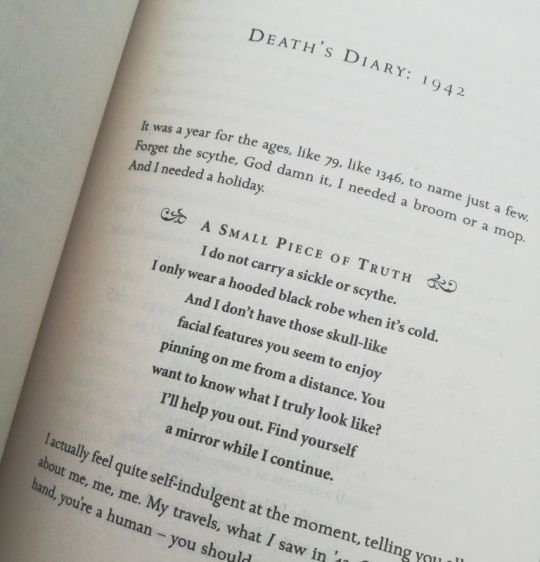
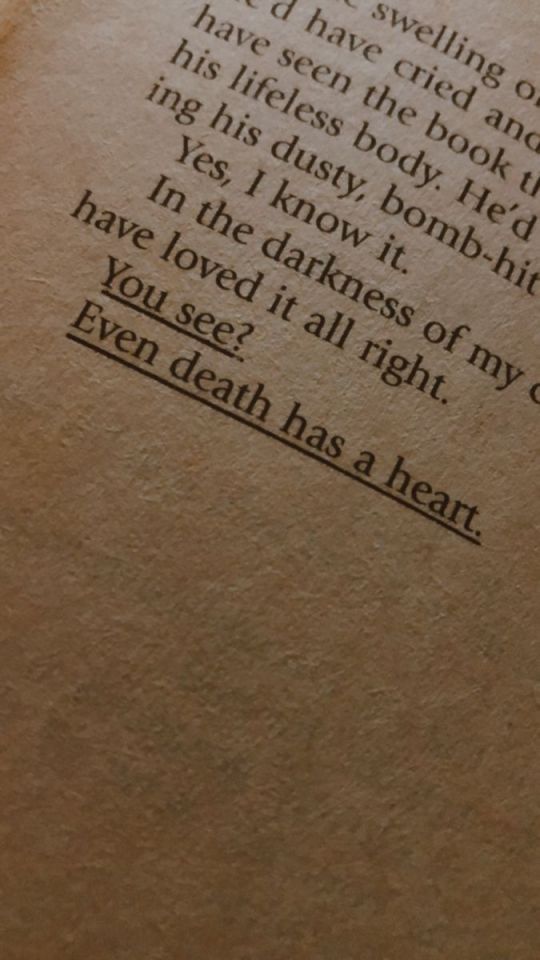

Being set in the N a z i Germany era, the historical fiction this novel possess is truly a delightful sorrow. Destiny and a young girl, Liesel Memminger, with a mother and brother. Neither of them with her for long. (I am sorry). The timeline if I am not wrong, correctly aligns with the real-life events and the mentions of the camps and tortures are true to the bone. Liesel Memminger, fascinated by novels and books since when she couldn’t even read a single thing. A girl truly just filled with passion and burning desire, enough to steal books from frosted graveyard to sizzling bonfire to the comforts of a mayor’s wife’s library. Liesel accesses the true powers of words. Or at least begins the journey to it. It is her reading that calms the neighbourhood taking shelter in the basement from the fireworks in the sky. It is her reading and writing which saves her life.
The Hubermanns…oh dear me! As I started the book, I was under the impression it was going to be a typical foster home that treats the foster kid poorly. Which then contributes to the child’s trauma and makes its life worse and the book longer. But how wrong I was! I was expecting Hans to act extremely abusive and shady with Liesel. That’s the initial impression I got from him. But I was bound to love his character, what a father figure. Former WWI soldier, the best accordion player, and a painter with the biggest heart. A man of his word truly, despite having conflicting thoughts in his mind. To stand with his country and son or with the man who he owes his life to? I wouldn't say he was flawed or had many bad traits but the ideals and morals he stood up for, what he bled and broke for, were truly remarkable. This man has my utmost love and respect. My mind sort of fan cast-ed David Thewlis as Hans and I am very happy that is did. Wonderful character designs, I must say.
Oh, Rosa Hubermann, I expected her to be an evil stepmom who constantly abuses her daughter and is only after money. I mean, yes, we do get the impression of her being a sharp tonged mother with a bad temper,for a long time but like Death says Rosa is a good woman for a crisis. How she gathers herself and protects everyone who was near her. She won’t let anyone sleep hungry, and she won’t let Liesel grow up too fast, whom she abuses, quite a lot of times…but that is just her love language. Just as Hans's love language for Liesel is to spend time with her when she needs it. Be it waking up in the middle of the night to soothe her, to change her soiled bedsheets or to teach her how to read and provide her with a book any chance he got, despite the financial situation. And for Rosa, his love language was to irritate her with his accordion playing and more. I was absolutely broken at those moments when the same Rosa who used to shout and curse at Hans for playing the accordion instead of finding jobs, used to hug the very thing she despised, for she missed the man she so dearly loved. Hats off to Markus Zusak to have created such multi-dimensional people in this story. So realistic. Very much along the philosophy of everyone has both good and bad sides. Soft and hard insides.
Which reminds me of Rudy Steiner. Damn him. Liesel’s neighbour, from her arch enemy to her best friend. God, I truly felt like a teenager reading those moments with him and Liesel. The first encounters, Jessie Owens incidents, the funny banters, the thieving, the standing up for each other and the asks for a kiss. Oh! How Death used to mock us with the words like how Rudy will finally get his kiss, but it would be too late for him. Death’s way of teasing the reader about what they wish would just happen and how it wouldn’t, the way they want to, by disclosing just enough details to keep them turning and tossing in the bed. I really hated and loved this style.



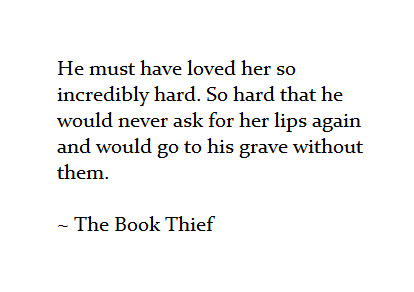
Love, heals, be it from the hands of Hans and Rosa or from Liesel’s. Concept of family and relations have been one of the key points I found being highlighted. Be it the relationship of Hubermanns and Liesel, or with Steiners or with Max Vandenburg, the Jew in the basement who writes two books for Liesel which helps Liesel understand people, friendships and devlopes her skills as a reader and writer, and who indirectly saves Liesel’s life through this way.
And I loved this book. I found happiness and joy while reading the saddest of the scenes, set in such a depressing phase of Human History. And with this, I was able to pick out the sadness and grief in the happiest of moments. This is what life is all about. Love, relations, problems, conflicts, joy and grief. How Death is not as fearsome as it is passed on. How a false propaganda and elitist views and ideals can cause havoc and vast genocides. How fun and laughter gets us through the hardest of times. And how we as humans, have the lifespan of a mayfly in comparison to the wonderful universe which surrounds us. Yet still, human life and relations we make along the way are as important as ever.
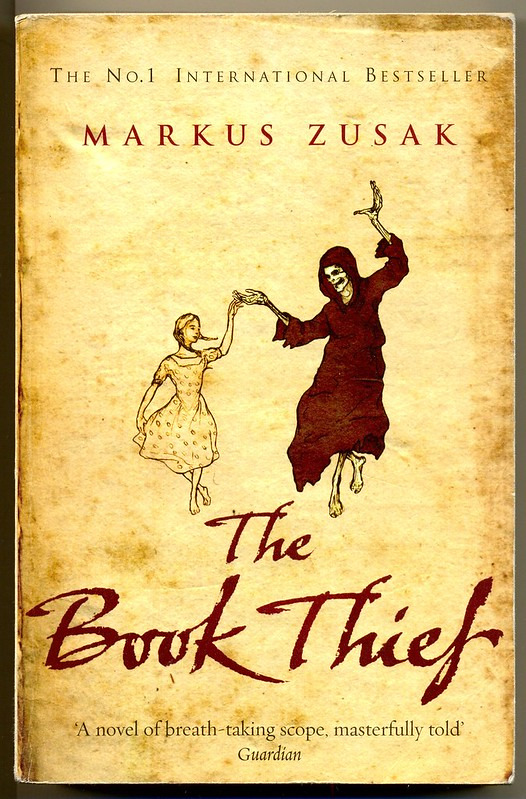

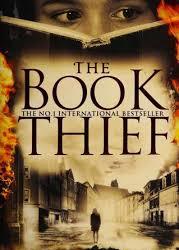
#asena rawlin#tumblr#aesthetic#dark academia#writers on tumblr#writers#tumblrfeed#creative writing#writeblr#writerslife#the book theif#the book thief#books and literature#currently reading#books and reading#fantasy books#stemblr#reading#library#vintage books#books#bookshelves#booksarelife#book recommendations#summary#about writing#feedback#book reading#favorite books#bookworm
30 notes
·
View notes